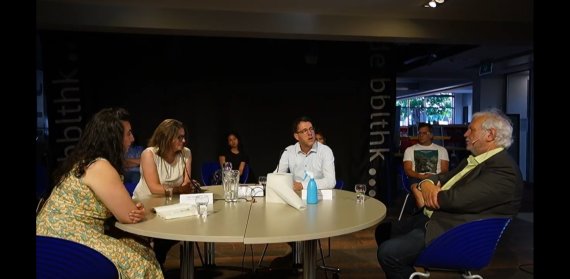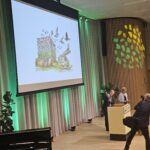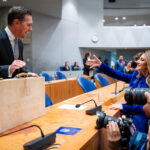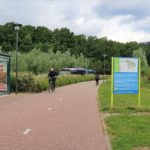Text: Rijk Dersjant
Students, Wageningen citizens and the local government spoke on the impact of corona on Wageningen as a student city during a debate in the library yesterday evening. Summarising: there is cause for mild optimism.
This was the first debate in a series on ‘Wageningen in times of Corona’. Representatives of WUR, the Student Alliance, the municipal executive, Idealis. KSV Sint Franciscus and Loburg café were given the floor. The discussed how student city Wageningen should address the ‘new normal’. What was the impact of the corona crisis, and what will the city be like in the future?
‘Students miss campus life, and all that it includes’, treasurer Sammy Xie of the Student Alliance states. The Student Alliance represents the interests of students. ‘The transition to online education was a swift one. It led to isolation among students and to loneliness. Many Dutch students decided to return to their parents’ homes, but this option was not available to international students. They often felt the measures were unclear and they were therefore affected more.’
Less than ideal
Dean Arnold Bregt agrees. ‘At first, online education focussed on content. It was only at a later stage that the question arose how the students were doing. We studied this. Both students and teachers feel that online education is less than ideal. Ten to twenty-five per cent of the students disappeared from view entirely. The lack of social contact and motivation certainly contributed. The university is, however, optimistic about the coming months. We are preparing for small-scale interaction with students from September. The university will reopen slightly.’
I feel the students deserve a compliment; their behaviour over the past months was exemplary
Bart van As, director/administrator of Idealis
The number of bachelor’s students to start the upcoming academic year is more or less equal to last year. Estimating the number of master’s students is more difficult, says Bregt. ‘They often have visa issues, and much is still unclear at the moment. What the influx of master’s students will be like remains to be seen.’
Exemplary
Bart van As, director/administrator of Idealis, closely witnessed how the government regulations affected the student corridors where many Wageningen students live. ‘Student life has disappeared completely’, Van As says. ‘We offered the students painting and cleaning kits to keep them occupied during the crisis. I feel the students deserve a compliment; their behaviour over the past months was exemplary.’ On the bright side, Van As says that the slow months allowed Idealis to ‘improve the quality of student housing during the crisis.’
Anne Janssen, alderman of residential areas, spatial planning and culture, agreed. ‘It is important for us to take that step.’ Janssen was unable to answer the question of why students living in student housing were not considered a household when outdoors. ‘The exact reason does not come to mind, but it has to do with checking the residential address. This policy was initiated in consultation with the mayor, so it would be best to ask him for details. Inside the homes, however, the students were considered a household.’
Catering
Catering entrepreneur Casper Bijl of Loburg café is delighted that there is now more freedom for the catering sector and local residents. ‘The catering sector thrives on fun and activities—many of our plans collided with the one-and-a-half-metre rule, which was frustrating. Now, we are planning concerts again. We expected a run on the terraces once they opened, but the number of guests was less than expected. The customers were wary.’
Students were not at all eager to come to the association when it reopened
Amber Laan, chair of KSV Franciscus
Amber Laan, chair of KSV Franciscus confirms the sentiment of caution. ‘Students were not at all eager to come to the association when it reopened. We held an online quiz, online cantus and online general assembly, but, at the end of the day, it’s not ideal. Moreover, we have lost contact with a number of students, and we were worried about first-year students. Those worries are less now. Getting to know the new students is very important, so the fact that the AID will continue in an adjusted form is great.’
Future topics
The next debates are planned for 1 and 8 July. On 1 July, entrepreneurs will discuss the impact on local businesses, and on 8 July the topic is: ‘Will we get together again?’. The discussions take place from 20.00-21.00 hrs and are available for viewing in the library’s YouTube channel.
In Resource’s edition of Thursday 2 July, we will share the stories and experiences of teachers and students with online education over the past months.

 Screenshot van de livestream van het debat. V.l.n.r. aan tafel: Tutku Yeksel (gespreksleider), Anne Janssen (wethouder wijken, ruimtelijke ordening en cultuur), Bart van As (directeur-bestuurder Idealis) en Eric Wijnackers (gespreksleider). De overige gasten zitten op de achtergrond. Foto: Rijk Dersjant
Screenshot van de livestream van het debat. V.l.n.r. aan tafel: Tutku Yeksel (gespreksleider), Anne Janssen (wethouder wijken, ruimtelijke ordening en cultuur), Bart van As (directeur-bestuurder Idealis) en Eric Wijnackers (gespreksleider). De overige gasten zitten op de achtergrond. Foto: Rijk Dersjant 

